Eve. #558, it was off the list in 1937, and from 1985-1997. It comes from the Hebrew word for "to breathe." The most famous (and first) bearer of the name is, of course, Eve from Genesis (written 6th-5th century BC). I think Eve is a nice name, biblical, with a streak of the bad girl, though not as daring as Jezebel or Delilah. I predict its popularity will increase, especially if names like Ava and Ada stay in vogue.

Elfrida. This spelling never ranked, but variant Elfreda ranked in 1894. This Anglo-Saxon name means 'elf strength,' which is kind of cool. One famous bearer is Elfrida Andree (1841-1929), a Swedish organist, composer, and feminist. This name is dead, never to return.
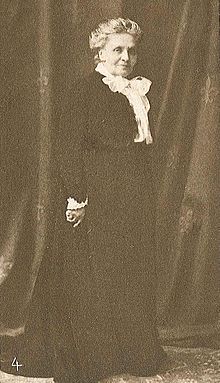
Elinor. Not ranked, it fell off the list after 1953. I've actually always liked this spelling, and think it might come back, especially if classic names for girls remain trendy. It's easier to spell than Eleanor, and makes more sense phonetically. Plus, it seems friendlier and more easygoing than Eleanor. One famous bearer is Elinor Glyn (1864-1943), a British scriptwriter and novelist who wrote things that were just on the edge of decent. She also came up with the concept of the It-Girl.

Elonore. This name has never ranked, nor will it ever. I can't find anyone famous with this name. Godey's missed the boat on this one.

Eleanor. #195, it has never fallen from the list. It ranked as a boy's name in 1908. Godey's says the name means "compassionate," but that definition seems rather spurious to me. Behind the Name says that the name originated with Eleanor of Aquitaine (1124-1204). She was named after her mother, Aenor, but then called alia Aenor, the other Aenor. One of the most powerful women of the Middle Ages, the name spread through her influence. It seems that the name breeds powerful women, because centuries later First Lady Eleanor Roosevelt (1884-1962) used her intellect and ambition to be a real force for positive change in the United States.


Eleanora. Not ranked, it fell off the list after 1939. A pretty name, but perhaps needlessly complex, it is a step up from the already-elaborate Eleanor. A famous bearer is the legendary actress, better known by her last name, Duse (1858-1924).

Eliza. #225, it was off the list in 1954, 1958-65, 1967, and 1971. It made the boys' list in 1880. I was surprised by the years it failed to rank, because the 1956 Broadway musical My Fair Lady, as well as the 1964 film adaptation were such huge hits. Of course, the most famous bearer is Eliza Doolittle, who made her debut in George Bernard Shaw's play, Pygmalion (1912). Ladylike, but mischievous and spirited, I think Eliza is a splendid name, for flower girls and duchesses alike.

Elizabeth. #10, it has never fallen from the list. Indeed, it has never even fallen from the top 30. It's also seen fairly steady use as a male name, ranking in 1880, 1882-1912, 1926-27, 1929-32, 1934-42, 1960-61, 1965, 1969-70, 1979, and 1981-89. It means "My God is an oath" in Hebrew. It's a stately name, but still approachable, and can be shortened in a million different ways. Most importantly, it's timeless, and has thus escaped the fate of Barbara and Deborah. There are tons of famous bearers, but two of the most prominent are Queen Elizabeth I (1533-1603) and screen star Elizabeth Taylor (1932-2011).
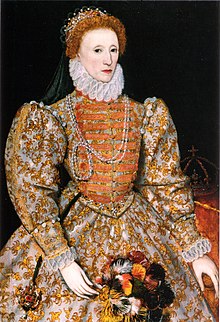

Elvira. Not ranked, it fell off the list after 1976, but reappeared in 1978 and 1981. It is a Visigothic name that means "all true." A famous bearer is Elvira Casazza (1887-1965), an Italian mezzo-soprano. I wouldn't expect too much from the name.

Elmira. It means "noble famous." It was on the list until 1932, in 1934-35, and in 1937. A famous bearer is the character Elmire in Moliere's 1664 play Tartuffe. The image below is from the German National Archive. Both Elmira and Elvira are kind of cool names, but seem stuffy and harsh.

Emma. #2, it has never fallen off the list. It was #1 in 2008, and has made the top 5 since 2002. It was ranked #3 from 1880-86. It made the boys' list 1880-96, 1898-1904, 1906-07, and in 1910. It comes from the German for 'whole.' One famous bearer, of many, is Emma, Lady Hamilton (1765-1815). An actress and model, she was beautiful, charming, and smart. An ambitious suitor who wanted to be rid of her to marry a wealthy woman tricked Emma into marrying his widowed uncle and shipped her off to Naples. She gained a title, and at least enjoyed each other's company. She hung out with royalty and charmed everyone she met, including Admiral Horatio Nelson. She became his mistress, and her elderly husband was totally cool with it, and all three of them were great friends. After a meandering sea voyage, the three made it home to Britain, and lived together. Scandalized, the Royal Navy sent Nelson back to sea, and the rest is history. Sadly, the British government refused to aid Emma and her daughter Horatia, and she died a penniless alcoholic at the age of 49. Still, a truly remarkable woman. Emma is in absolutely no danger.
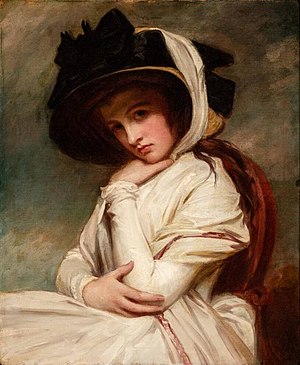
Emmeline. Never ranked, I think it's a lovely name, and one that may catch on here. Parents love to give children fusion names, and even though Emmeline is a Norman name, it is a combination of the perennial favorites Emma and Madeline. A famous bearer is the famous British militant suffragist, Emmeline Pankhurst (1858-1928).
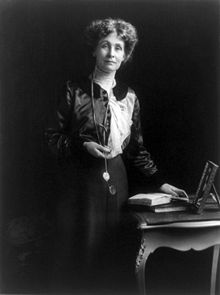
Eugenia. Not ranked, it fell off the list after 1984. It means 'well-born' in Greek. A famous bearer is Chilean patroness of the arts, Eugenia Errazuriz (1860-1951). She inspired Coco Chanel, and hung out with Picasso, Stravinsky, Cocteau, and many other famous people. I don't expect to see the name make any resurgence in popularity, but I do like it. It's feminine and delicate, but also very distinguished.

Eloise. #364, it dropped off the list after 1965, and only reemerged in 2009, climbing astonishingly fast. It means 'healthy and wide' in German. The most famous bearer of the name is very near and dear to my heart, the titular heroine of the Eloise books (1955), written by Kay Thompson and illustrated by Hilary Knight. They tell the story of a precocious six-year-old who lives at the Plaza Hotel and wreaks havoc. I think the name will continue to do well. It's charming and cute, but seems timeless and classic.

Emily. #6, it has never fallen off the list. Not popular in the English-speaking world until the 18th century, it comes from a Late Latin family name that means 'rival.' [A brief aside, if you knew me in middle or high school, you will grasp the significance of this.] One famous bearer is the American poet Emily Dickinson (1830-86). I think this name is sweet and charming, while being very humble, and perhaps demure.

Emilia. #268, it was on the list until 1942, 1947-48, 1982, 1988, and since 1990. It has increased a good deal in the last three years, some of which may be due to the influence of actress Emilia Clark (born 1987), who plays Daenerys Targaryen on Game of Thrones.

Ethel. Not ranked, it fell off the list after 1975, but was in the top 10 from 1888-1903. It ranked as a male name 1880-81, 1884-1911, and in 1913. Surprisingly unisex, it means 'noble' in Old English. I think it will eventually reappear (as a girls' name), but not immediately. It still sounds rather matronly, but it would make a really cute middle or double name. One famous bearer is Broadway actress Ethel Merman (1908-84). Another namesake is actress Ethel Barrymore (1879-1959), Drew's great-aunt.

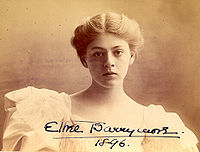
Eunice. Not ranked, it fell off the list after 1978, but reappeared in 1980, 1982-83, and from 1985-95. It means 'good victory' in Greek, which is cool, but this name is dead, probably for a good long while. I don't know how it became the go-to nerd name in pop culture, but it did. One famous bearer is Eunice Kennedy Shriver (1921-2009), sister of John, Bobby, and Ted, she was also the sister of Rosemary, the eldest Kennedy daughter, whose mental capacity, on par with that of an 8-12-year-old, was destroyed by a botched lobotomy, at the age of 23 she was reduced to the mental capacity of a two-year-old. This sad outcome sparked a passion in Eunice, and she devoted her efforts to aiding the mentally ill, and especially the developmentally disabled. Her most famous achievement was founding the Special Olympics.
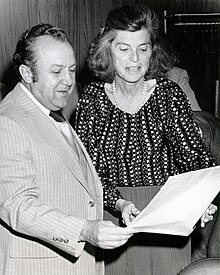
Ermengarde. This name never ranked, and I seriously doubt it ever will. Very ancient, it derives from the Germanic words meaning 'whole protection.' It was quite popular in the early Middle Ages. A famous-ish bearer is Ermengarde, Viscountess of Narbonne (1127-1197). She seems to have had a bit of political power, and was quoted three times in the 1190 "Treatise on Courtly Love," and may have had a Viking write some poetry to her. Like I said, there were tons of medieval women with the name, but most medieval women didn't do much. The image is a sketch of a coin minted by her husband; it would bother me if one name didn't have an image.

Euphemia. Not ranked, it was on the list in 1880-81, 1883-85, 1889, and 1903. It means 'to speak well' in Greek. One famous bearer is Euphemia de Ross (died 1386), a Queen Consort of Scotland. The 'Eu-' just seem to have lost their appeal.
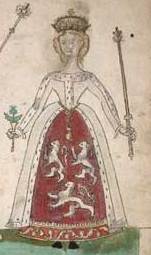
Euphrasie. Never ranked, it means 'good cheer' in Greek. This Eu- name is fairly pretty. One famous bearer is Mother Euphrasie Hinkle (1847-89), a Methodist convert who became Superior General of the Sisters of Providence. In Victor Hugo's novel Les Miserables (1862), Cosette assumes the alias Euphrasie Fauchelevant, so if you love Les Mis, but don't want to make your little lark such an obvious homage, you can opt for this extremely subtle nod.
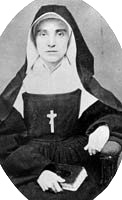

Frances. #764, Frances has never fallen from the list. It made the boys' list from 1880-1944, and in 1947. It means 'Frenchman.' One of many, many famous bearers is Frances Newton, Lady Cobham (1539-92), one of Elizabeth I's BFFs. I think the name will continue to hang on for a good while longer.

Fanny. Not ranked, it fell off the list after 1936, and reappeared once in 1938. A diminutive of Frances, this is a rather cute nickname, except for the fact that it's anatomical slang on both sides of the pond. Here in the States it means butt, and in the UK it means vulva. Yeah, Fanny, as a name, is dead. One famous bearer is the American comedienne Fanny Brice (1891-1951). She became famous playing in the Ziegfeld Follies, and Barbara Streisand played her in Funny Girl. Another famous namesake is Fanny Jackson Coppin (1837-1913). Born a slave, she graduated from college in 1865, and became an educator and missionary. She was really cool.


Francisca. Not ranked, it made the list from 1882-1954, in 1957, 1960, 1969, 1971, 1973-76, 1978, 1980-82, and 1985. A lovely Spanish/Portuguese form of Frances, I expect this name will come back sooner rather than later. A famous bearer is Maria Francisca of Savoy (1646-83), Queen of Portugal.

Florence. Not ranked, it fell off the list after 1981. It was in the top 10 from 1886-1904, and ranked as a male name from 1880-1912, and in 1914. From the Latin meaning 'flourishing,' I expect this name will flourish again in the States soon enough. It's quite a nice name, elegant without being ostentatious, and feminine but strong. A famous bearer is Florence Nightingale (1820-1910), the founder of modern nursing. When she traveled to the Crimea, nursing was not considered a proper occupation for women. She also established the first secular nursing school, helped draft policy that improved healthcare in England, advocated for better living conditions in India, and helped get Indian prostitution laws that were overly harsh on women struck down. She was a statistician and a prodigious writer, and all new nurses take the Nightingale Pledge. This would be a great name for a nurse's baby, or for a baby who overcame health problems with the help of dedicated nurses. What better way to honor a woman who changed not just medicine, but also the prospects of all career-minded women who came after her?

Flora. Not ranked, it fell off the list after 1972. It ranked as a male name in 1880 and 1904. From the Latin for 'flower,' this is a simple and cute name that I think will one day make a comeback. A famous bearer is Flora MacDonald (1722-90), a Scottish woman who was so badass she deserves her own post. In a nutshell, she helped Bonnie Prince Charlie escape the English by dressing him up as a woman, was imprisoned in the Tower of London, moved to America, helped the British during the Revolution [nobody's perfect], had her husband taken prisoner, lost everything when the Patriots burned her home, got shot while fighting pirates, and still managed to impress people with her gentle nature, kindness, and elegance.

Fidelia. Not ranked, it made the list in 1880, 1882, and 1890. It means 'faithful' in Latin. I do think it's a pretty name, but dictators ruin names, and people might assume a girl with this name was named after Mr. Castro. A famous bearer is American watercolor artist Fidelia Bridges (1834-1923), she was involved in the American Forest Association, and some of her works are housed in the Smithsonian and the Metropolitan Museum of Art.

Floribel. Never ranked, I can't even find anybody with this name. Enjoy one of Fidelia's watercolors.

Flavia. Not ranked, it only made the list in 1881 and 1884. It means 'golden-haired' in Latin. I think it's a pretty name, but don't expect it to ever take off, barring some pop culture phenomenon with a heroine named Flavia. That might get it on the board, but not much else. A famous bearer is one of main characters in Anthony Hope's 1894 novel, The Prisoner of Zenda, which sounds like it should be a video game, but isn't.
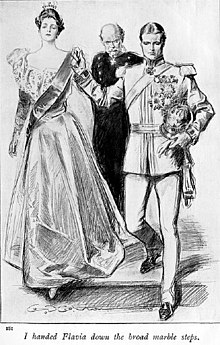
Felicia. Not ranked, it made the list 1880-82, 1884, 1886-91, 1895, and 1897-2005. I suspect it will pop back up in a few years, since it seems like it has a tendency to do that. It means 'lucky' in Latin. A famous bearer is English Romantic poet Felicia Hemans (1793-1835). Like all good Romantics, she died young, but unlike her contemporaries, she gave birth to five sons and balanced a family with her literary career, not sacrificing one for the other.

No comments:
Post a Comment